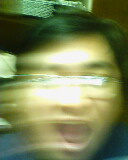The Primary Question - March 26, 2006
The Primary Question
26 March 2006
It is the expectation that after going over our admittedly belaboring lectures, all of us are now armed with the critical language to understand ourselves from the rubric of modern social philosophy. What we essentially did was to trace the origins of modern individualism with the rise of capitalism and relate this to contemporary postmodern persuasions championed by the likes of Foucault and Rorty. The simple thesis being that the primacy that modern and postmodern social philosophy has placed in the individual agent which sometimes manifest itself in the various socio-philosophical depictions of the Self is a product of a historical moment in capitalism’s development. Thus Hobbes and Locke’s regard for the individual’s political and economic rights must be understood as an ideological defense of the rights of the new property class. And ultimately the same can be said for the more complex formulations of contemprary thinkers like Foucault and Rorty. Amidst the seemingly circumspect and nuanced regard for the tragic yet empowered modern individual, these post/modern thinkers espouse either a defeatist politics or a celebratory stance that herald liberal democracy as the end of history.
Borne of the same modern imperatives but dissatisfied with capitalism, Marx presents a depiction of the Self that is inextricably bounded and dialectically related to political and economic realities. He believes that individual freedom within the confines of capital is a false freedom. This idea was pursued by Althusser in his discourse on the ideological reproduction of capitalism. Unlike Foucault, however, Althusser maintains that there is an escape from this capitalist prison and that is socialist revolution. These marxist persuasions thus challenge the false autonomy of modern individuals and insist that personal liberation is only possible when we have freed the productive forces from the domination of one class.
These ideas provide the theoretical underpinning of the class for the whole semester. Their relevance is in providing us with the theoretical tools to problematize how it is to be a young citizen of a third world country such as ours. In case you missed it, but this has been the question that has been posed to us throughout the whole semester.
Answering such question intelligently means confronting the theoretical dilemmas posed in class. They maybe distilled to these two questions:
1) Do we accept the freedoms that liberal democracy and its economic logic, capitalism, offer to us as sufficient? In which case, it is possible to become an adherent of Locke, Hobbes, Nietzsche, Foucault or Rorty. These thinkers may not exactly espouse the same ideas but they are similar in either acceptance of capitalism to the point of celebration (in the case of Locke, Hobbes, and Rorty) or acceptance because of capitulation (such as the case of tragic Foucault) . 2) Or do we reject the way things are, challenge the taken-for-granted realities in our midst, understand the political and economic circumstances of our third world existence and consequently resist? This stance would ultimately point you to a Marxist understanding of the world. Thus, this would entail a critical regard towards the kinds of freedom we enjoy as individuals in recognition of the poverty, injustice and exploitation in our midst. These are difficult questions to answer. Hopefully, the subsequent reports in class helped you determine your convictions.
The reports were meant to provide a broad survey of Philippine social realities. Allow me to summarize some of them. We tackled our problematic past and found heart-breaking narratives of elite betrayal and colonial plunder. Our past is like a recurring nightmare and there seems to be no immediate reprieve in sight. And one persistent nightmare is the destitute poverty of many of our people in the midst of the few who enjoy the good life. However, this wide class divide is not a dream. It provides the very basis for the dynamics of our social, political, cultural and economic life in the past and the present. A quick assessment of contemporary social institutions would betray this truth. One need only to listen to the stories of pain and suffering that the OFW Filipino family experience as they endure separation just to secure a decent living. This economic pressure also results to acts of desperation among the poorest of the poor as indicated by spectacular crimes and suicides. One wonders if the church remains a source of strength for people in these trying times. Mass media seemed to have replace the church in this regard. Television has become the primary conduit for the transmission of a dangerous consumerist culture. TV has flooded their consciousness with products, lifestyles, narratives that deadens their sensitivity and lust for a meaningful life. The current political administration reflects the worse of these symptoms. Arroyo represents a body politic in crisis because of the failures of decades of elite rule. It is in this context that we should address questions of how it is to be a citizen.
Given the options stated above, what does it mean to be a citizen of a nation in perpetual crisis? Will you accept the freedoms that are offered to you by the present political and economic system? Or will you struggle to engender new political and economic arrangements so that all especially the poor can finally partake of these freedoms?


0 Comments:
Post a Comment
<< Home